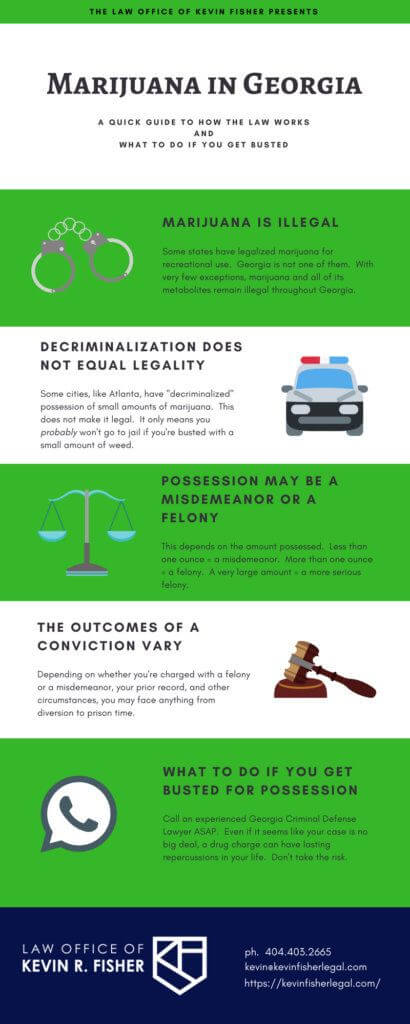The law can be confusing, especially since there are so many overlapping laws. This is especially true when these overlapping laws conflict with each other. For example, when you are located in, for example, the City of Newnan, you are subject to the laws of Newnan, the laws of the State of Georgia, and the laws of the United States. This means that you can legally be arrested by Newnan Police Department, the Coweta County Sheriff’s Office, Georgia law enforcement such as the Georgia State Patrol and the Georgia Bureau of Investigation, as well as any number of federal law enforcement agencies (such as FBI or Immigration and Customs Enforcement).
So what does that have to do with marijuana?
Most people are aware that several states have legalized marijuana in some capacity — some states allow its use solely for medical purposes, while others have legalized recreational use. As I noted in a blog post a few months ago, Georgia does allow possession of cannabis oil for certain medical conditions. However, for most individuals, marijuana remains illegal in Georgia. Under state law, it carries a maximum penalty of 6 months in jail and/or a fine of up to $1,000. Click here to learn more about the state law penalties of a marijuana possession charge.
Recently, a few local governments in Georgia have “decriminalized” the possession of small amounts of marijuana. These cities include Atlanta, Clarkston, Savannah, and, most recently, South Fulton. Fulton County has done the same.
Is weed legal in Atlanta now?
No. “Decriminalization” is not the same as legalization. It simply means that local police have the option to just issue a citation rather than arresting a person who is busted with a small amount of marijuana. That person may have to pay a fine as well, but the fines are capped at relatively small amounts, compared to the $1,000 fine that a person may receive under state law.
There are caveats
Decriminalization means that the police have the option to give you a citation instead of arresting you, but they can still arrest you. This is because marijuana is still illegal under state law. Ultimately, the judge may decide to convict you under the local ordinance rather than under state law (and fine you accordingly), but that can be cold comfort for a person who has to deal with the inconvenience and embarrassment of an arrest.
Decriminalization of marijuana will also not prevent an arrest if the police allege that you have committed additional offenses beyond possession of marijuana. For example, a marijuana DUI will result in arrest.
A piece of advice (or three)
If you live in one of the places where marijuana has been “decriminalized,” it may seem like getting busted is no big deal. While it’s true that the risks are slightly reduced, you still have rights, and you should assert them. If the police ask you about something they think you may have in your possession:
- You don’t have to say anything that might incriminate you.
- You shouldn’t consent to a search of your person or your vehicle.
- You shouldn’t consent to allow the police into your home without a warrant.
That’s not to say that you should be belligerent or argue with the police — that can result in additional charges. Just don’t volunteer information, and make it clear verbally that you do not consent to any searches.

